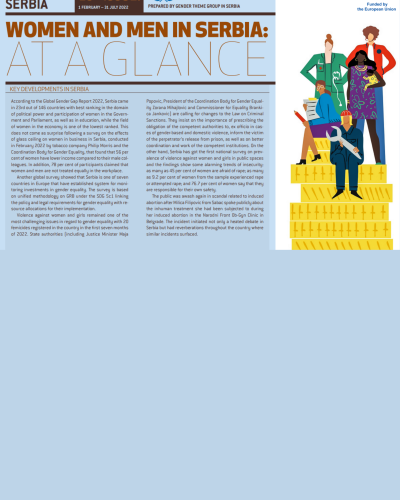Men and Women in Serbia: At a Glance

According to the Global Gender Gap Report 2022, Serbia came in 23rd out of 146 countries with best ranking in the domain of political power and participation of women in the Government and Parliament, as well as in education, while the field of women in the economy is one of the lowest ranked.
This does not come as surprise following a survey on the effects of glass ceiling on women in business in Serbia, conducted in February 2022 by tobacco company Philip Morris and the Coordination Body for Gender Equality, that found that 56 per cent of women have lower income compared to their male colleagues. In addition, 78 per cent of participants claimed that women and men are not treated equally in the workplace.
Another global survey showed that Serbia is one of seven countries in Europe that have established system for monitoring investments in gender equality. The survey is based on unified methodology on GRB under the SDG 5c1 linking the policy and legal requirements for gender equality with resource allocations for their implementation. Violence against women and girls remained one of the most challenging issues in regard to gender equality with 20 femicides registered in the country in the first seven months of 2022.
State authorities (including Justice Minister Maja Popovic, President of the Coordination Body for Gender Equality Zorana Mihajlovic and Commissioner for Equality Brankica Jankovic) are calling for changes to the Law on Criminal Sanctions. They insist on the importance of prescribing the obligation of the competent authorities to, ex officio in cases of gender-based and domestic violence, inform the victim of the perpetrator’s release from prison, as well as on better coordination and work of the competent institutions.
On the other hand, Serbia has got the first national survey on prevalence of violence against women and girls in public spaces and the findings show some alarming trends of insecurity: as many as 45 per cent of women are afraid of rape; as many as 9.2 per cent of women from the sample experienced rape or attempted rape; and 76.7 per cent of women say that they are responsible for their own safety.
The public was awash again in scandal related to induced abortion after Milica Filipovic from Sabac spoke publicly about the inhuman treatment she had been subjected to during her induced abortion in the Narodni Front Ob-Gyn Clinic in Belgrade. The incident initiated not only a heated debate in Serbia but had reverberations throughout the country where similar incidents surfaced

